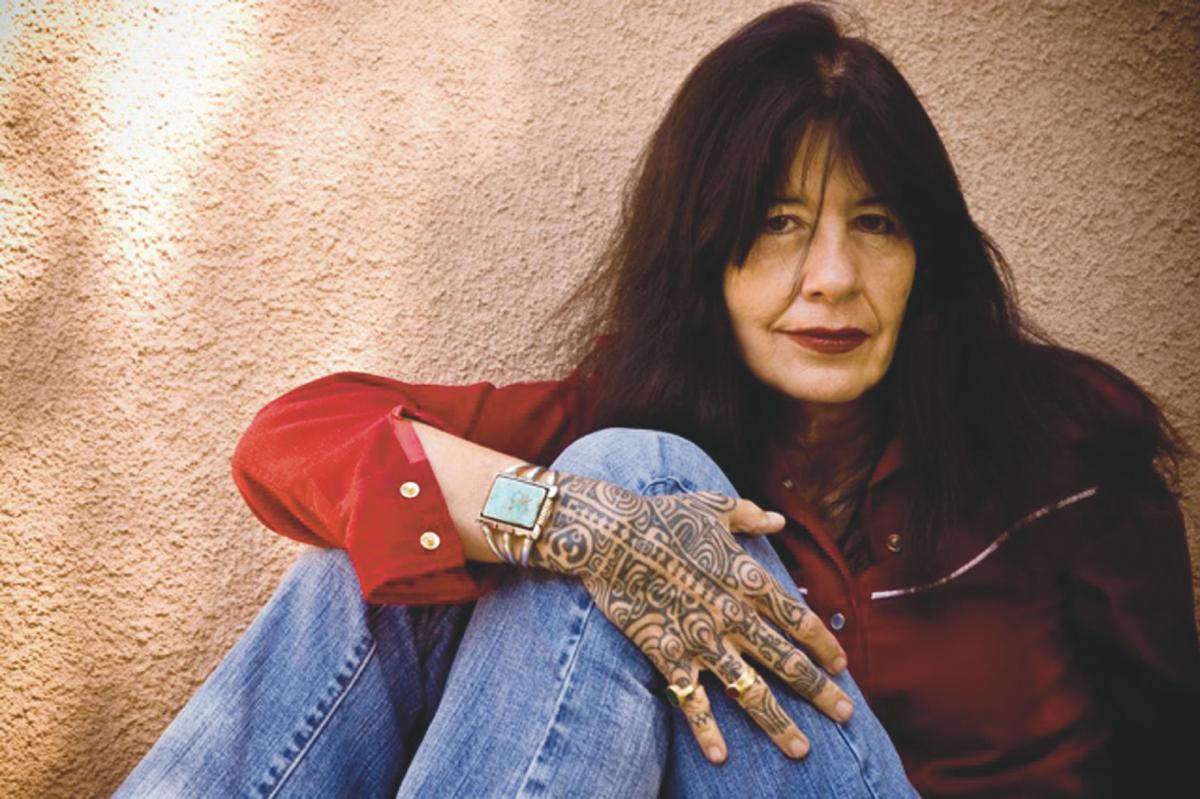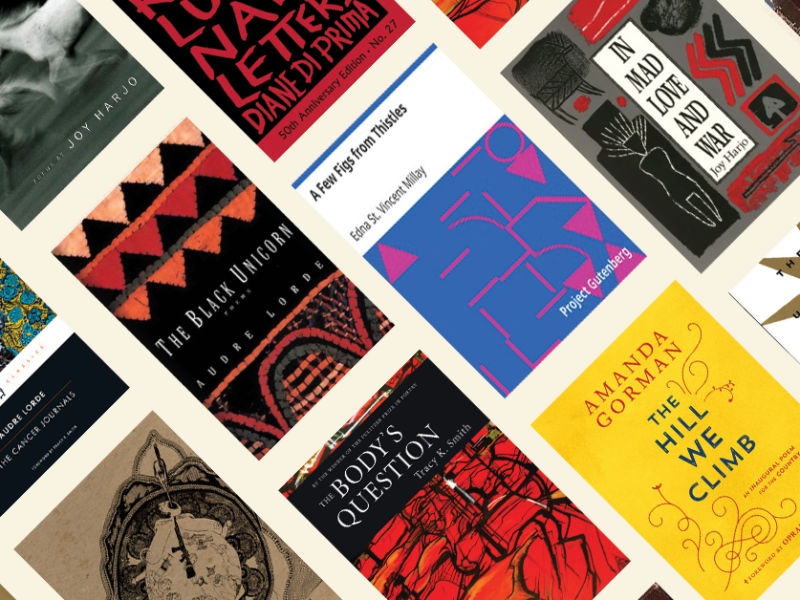Joy Harjo Talks Memoir, Poetry, and Diversity in Publishing
This interview originally appeared in 2016 in Harbinger, the award-winning literary magazine from Stephens College.
Joy Harjo is the author of eight books of poetry, including Conflict Resolution for Holy Beings and How We Became Human: New and Selected Poems. Her memoir Crazy Brave won the PEN USA Literary Award for Creative Non-Fiction and the American Book Award. She is the recipient of the 2015 Wallace Stevens Award from the Academy of American Poets for proven mastery in the art of poetry; a Guggenheim Fellowship, and the William Carlos Williams Award from the Poetry Society of America.
Rachel Cooper: Your first volume of poetry was The Last Song. Tell us about your early writing career, pre-The Last Song. Was that your first project or did you have other things you wrote before it?
Joy Harjo: That was a chapbook that came out while I was an undergraduate in my last year. It took me five years to get through school because I changed my major from studio art to creative writing. I started publishing in the student magazine called Thunderbird. It was an undergraduate student magazine, and my first poems were published there. Nothing I published there ever wound up in my chapbook, but that was the first place I published. There was a very lively literary community. There was a feminist magazine called Best Friends. There were a lot of readings, and it was a very good writing program, so there was a lot of activity there.
RC: Tell us about your first poem. Where did the idea come from?
JH: The first poem I ever wrote was in eighth grade when our teacher came in and told everybody to write a poem, and we thought, “How do we do that?” I had read poetry and liked poetry, but to actually write it was another endeavor. She never gave us anything we could hold onto. She didn’t run us through any exercises; she just told us to write a poem, and then later she decided there was an anthology that she wanted to enter her students in, but we were in the dark. We sat there and never talked to each other. I wrote a poem for that, but it didn’t get in the anthology. My short story made it in and was awarded honorable mention, but I have no recollection of what either one of them was.
When I was a little older, I wrote acid rock songs for an Indian band. The next poem I wrote was a horrible limerick to comment on being bored in class in eleventh grade, but that was the extent of it until my first semester at University of New Mexico. I was getting involved with a guy who turned out to be one of the major Native American poets, so I was around it, and I wrote a few poems that were silly. There wasn’t much there, but I think for me a crucial moment was hearing other poets—hearing them read. I remember hearing Anne Waldman read, and also hearing and reading Native American Poets and finding their work. I was watching a TV show one night about a poet healer, although the show didn’t say this person was a poet healer. This person in their tribe sang the poem, and what was astounding was that they became what they were singing. That stayed with me.
After that, I just started writing poems. I realized after reading and listening that I could write about what was going on around me. That realization was huge because up until that time, I really believed that most of the poets were in England and were old white men—at least that’s what we were reading in school.
There was Emily Dickinson, but she was a strange recluse; she was a lone woman’s voice. Although, there were some others—Elizabeth Barrett Browning and a few other women—overall the landscape for poetry was mostly from the shores of England or the East Coast.
RC: You are a well-established writer with many published works and esteemed awards. How do you feel you have changed and grown as a writer since you first started writing?
JH: When you engage with a discipline, you can’t help but grow with it, whatever discipline that is. Writing certainly teaches me to listen, but it’s an ongoing journey; I’m always learning something new. It’s a journey about reading poetry from all over the world and learning from these poems and those places. My own poetry changed from being one-image-driven, which had a lot to do with being a young single mother, to more complex. At one point I got into prose poetry and being very prosaic through longer poems. It’s been a journey including poetry and music, but what’s compelling is that there’s always something to understand about language and the power of words. There’s always a universe of new directions and knowledge. It’s exciting.
RC: In your reading here at Stephens College you said, “Maybe all artists are activists.” Why is activism through art so important?
JH: Artists are usually a little ahead of everyone because they’re going into the space of the imagination, which is where everything comes from for all of us. Even a child is imagined somehow by its parents.
Artists are a little bit ahead in consciousness, in creation. I think of activism as a part of the imagination. It’s the ability to imagine a world with justice, with equal rights for women, with enough food for everyone, with the ability to have a table and space instead of being in a boat sinking somewhere in the Mediterranean because you’re trying to find a home.
RC: I’m interested in your work as a memoirist and poet. As a memoirist and poet myself, I’ve often heard from my professors and from fellow writers that the two genres go hand-in-hand, and often writers who dabble in one genre feel comfortable with the other. Do you agree?
JH: I never really thought of poets and memoirists. I usually thought that writing fiction is closer to writing memoir because you’re using similar narrative structures, but you’re right—there are a lot of poets who write memoir because it’s easier to give yourself permission; after all, it’s your life. Memory is a funny thing, an memory changes with time. Memories, in a way, have their own lives and assert themselves in different ways, at different times. You’re probably right that poets would be more likely to write memoir because of the permission. I don’t know that for sure, but it makes sense.
RC: Tell us about your writing process for your new book of poetry Conflict Resolution for Holy Beings. Where did the poems come from? What challenges of surprises did you face?
JH: I wrote those poems over a period of time. It was quite some time from Map to the Next World, which was my last full book of poetry. I accumulated some poems between that period of the last book, and I think some of the new poems in How We Became Human, a book of new and selected works, we’re not quite there yet. I went through a period where I really couldn’t write poems and couldn’t find them. Sometimes things are there, and sometimes they’re not. I was also working on other things. I did the memoir, Crazy Brave, and then poetry returned to me. I wasn’t sure poetry was going to return in the way it did, but it did come back, and I took some of those poems that weren’t working and totally revised them.
They all come out of the idea of conflict resolution and the question of, “How do you move about in this world?” That was the organizing principle, and the poems seemed to fit with that question as the organizing theme.
RC: You mentioned in your reading that you are working on another memoir. Will you tell us more about that? Are you working on anything else new?
JH: I got a contract, a Guggenheim Fellowship, to work on another memoir. It’s about activism and the Native rights movements seven generations back and maybe even looking seven generations forward. It might be a historical memoir. I’m not sure how it’s going to work yet. I’m working on new music. I’m also working on getting the book together for Wings of Night Sky, Wings of Morning Light, my one-woman show. Priscilla Page, who’s working on it with me, sent me interview questions that are taking a while. We have articles and essays by different people in the Native theater program, so I’ve been working on that. I will also be teaching at the University of Tennessee, Knoxville, starting in the fall.
RC: Who are you reading right now? Who should we be reading right now?
JH: Right now, my last semester at the University of Illinois at Urbana-Champaign, I’m not teaching, but I’m working with a Palestinian graduate student. It has been great for both of us to compare Palestinian and Native works. The project is focused on memoir, so I’m reading Edward Said’s memoir. I love talking with her about it, and reading through these memoirs and looking at colonization and personhood. You asked me what I’ve been reading—I’ve been reading Palestinian memoirs. (Laughs).
RC: I attended a panel of publishers recently at a conference in Minneapolis in which three representatives from literary presses—Graywolf, Coffee House, and Milkweed Editions—stressed the importance of diversity in publishing. Do you think that we are seeing an increase in diversity as far as works being published, especially poetry?
JH: That’s hard to say. My point of view could be skewed because I work in that field, but there was quite a controversy last year because most people being published are male writers, and The New Yorker published an issue on male writers—all white male writers. If you look at the theater, very few women get their plays produced, and it makes me wish that I had started this play (Wings of Night Sky, Wings of Morning Light) with a male name because I feel like being a female is often a handicap. There appears to be more diversity, certainly when you look at Pulitzer Prize winners, and even getting the Wallace Stevens award. No Native has ever received that award. In the history of that award, only three women and one black man have won. I think it’s the nature of the world, though the world is changing.
RC: What advice would you give to emerging writers?
JH: I remember being told that I shouldn’t publish anything for twenty years, but I don’t believe that. Now there’s a diversity in magazines and ways to publish, especially with the internet, that’s blown open. But it’s not really about publishing, it’s about taking care of your craft. I run into so many students and young writers who love to talk about writing, but then they don’t write.
It’s important to write, to listen, to read, and to spend a lot of time in quiet. A lot of it is writing and practicing your craft. Don’t compare—that’s one of the biggest things. You cannot compare yourself with other writers; everyone is different.
Your work is different too. I didn’t even realize how revolutionary my poetry was. I wrote poetry that pleased me and found my own way, but it wasn’t without struggle. American Poetry Review turned down the poems that became a major part of She Had Some Horses. That book didn’t win any awards, and those poems were rejected. I was turned down for all kinds of things, and now the book has become a classic. You have to believe in what you’re doing, and sometimes you’re the only one believing in it. Just take care of your gift.


